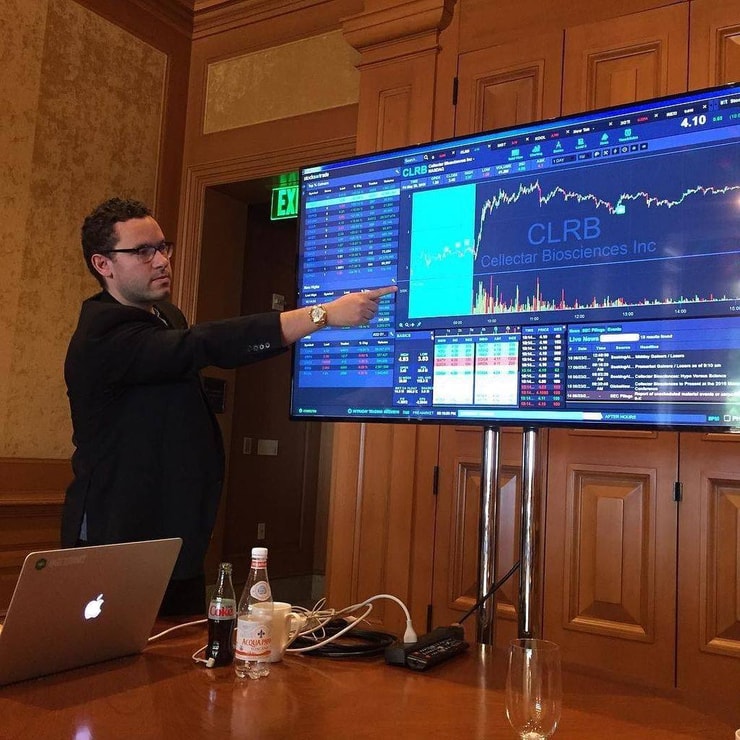Table of Contents
Think you’re ready to make a trade?
Not so fast. All too often, we act without planning and thinking things out.
While you never want to drag your feet, acting without forethought can be even worse.
So as you’re on the precipice of your next trade (and every trade), pause to ask yourself these seven things and yes, watching this stock trading guide and using this free tool before EVERY trade will help your odds of success dramatically.
It might sound like a lot, but after a while, pre-trade planning will become an automatic part of your process. Over time, this practice can improve your performance and help make you a better penny stock trader.
1. Am I prepared?
Before any trade, ask yourself if you are truly prepared, on every level from potential risk to potential reward.
- First, consider your readiness on a very literal level.
- Have you gotten enough sleep?
- Did you wake up early enough to have some quiet time before you got to trading?
Really take a moment to evaluate if you are mentally prepared to trade right now, or if you have a million things going through your mind that might be distracting you from making the best decisions. You need a clear head to be a good trader.
Second, consider your preparedness on a deeper level:
- Are you prepared as a trader?
- Have you received the proper training and education?
- Do you understand the stock, sector and overall market enough to confidently make this trade, or are you just taking a stab in the dark?
While most penny stocks don’t trade on the major market exchanges, there are still some basics that you need to understand if you want to be successful.
The Timothy Sykes Millionaire Challenge was created to provide an educational resource for traders who want to succeed.
**
2. Have I done my research?
One of the key things I teach my Trading Challenge students is that you have to do your research BEFORE YOU RISK YOUR HARD EARNED MONEY IN THE MARKETS.
Don’t go into a single trade without having some basis of knowledge and ideally the more the better.
After all, you probably wouldn’t even go to a restaurant without giving it a cursory look-up online to see reviews.
Why would you invest your money in a stock that you haven’t checked out?
It may be annoying to research a stock that is trading for pennies, but often just a little bit of digging can reveal information that can let you know if it’s worth it or not.
Cut through the BS; don’t believe just what a self serving stock promoter tells you. Think for yourself and do your own research before committing to an investment.
More Breaking News
- Wynn Resorts Expands European Footprint with Mayfair Acquisition
- Joby Aviation Stock Slides After Cantor Fitzgerald Downgrade
- QuantumScape’s Stunning Stock Surge: What’s Next?
3. How much will it hurt if I lose it all?
Take a step back and ask yourself this question: how would it feel if this stock went south and you lost most or all of the money you invested?
No, this exercise isn’t meant to scare you off or to discourage you from making a trade. Rather, this can be a method of making sure you are properly mitigating risk.
If you haven’t even thought about the risk or are pushing it to the back of your mind, you may not be taking all of the proper precautions.
With the potential of loss looming, you might be inspired to do that extra bit of legwork to make sure that this trade is a good idea.
4. Am I forcing this trade?
In your desire to make a profit, are you putting on blinders to some serious red flags?
To really find success as a trader, you have to keep a level head and be able to think rationally and logically, think of yourself as a retired trader and ONLY come back into the market when a setup is so good you’d feel guilty missing it.
You don’t want to lose your patience as patience is what truly pays. You also don’t want to get cocky or else the market will humble you VERY quickly.
Approach every trade as a unique transaction. Sure, you can use the past to educate current and future decisions. But don’t think that if you force it this time it will end up like it did the last time you made a profit.

2025 Millionaire Media, LLC5. Is there a pattern here?
The fact is, every trade is unique and should be traded that way.
But at the same time, history often repeats itself.
When it comes to penny stocks, there are certain patterns which, if you memorize them, can inform your trades and help earn you consistent profits.
In my free guide entitled Penny Stocking 101, I go over some common patterns and potential ways that you can react as a trader; I also cover this in more detail with students of the Tim Sykes Million Challenge.
Once you get the hang of it, seeking out patterns is a great way to really look at a potential investment and evaluate whether or not it’s a good fit for you at this time.

2025 Millionaire Media, LLC6. What would my mentor do?
If you’re experiencing a moment of doubt or you don’t know what to do, try to channel your mentor.
What would he or she do in this situation?
The coolest thing about my trading chatroom is that there are SEVERAL Millionaire Traders there during market hours and it’s been great to watch newbies bounce ideas off more experienced traders.
More often than not, this can take you out of your head enough to get some distance from the situation and make the right choices in your trade.
7. What can I learn from this?
Most people think about what they learned after a trade is complete. But actually, there’s a lot of value in considering what you could learn from this experience before you actually buy.
For instance, if you’re trying a new method of investing, write down the questions and concerns that you’re having as you go through the process.
You can revisit these questions and concerns after the trade is complete, and you may realize that you’re better informed now.
It can be hard to think in the heat of the moment, so next time if you find yourself wondering the same things, you can think back to your previous experience and apply what you have learned.
Additionally, these questions can give you direction as you continue with your studies. You may realize that you need to learn more about selling short, for example.
Taking a few short moments to pause before making a trade can be a good thing. What you lose in your quick reaction time can save you from losing because of acting too rashly. Over time, these questions and considerations will become ingrained, and your overall performance can improve as your instincts become honed.
Have you ever asked yourself any of these questions before a trade and have you ever not asked these questions…then tell me which of these trades worked out better for you?








Leave a reply